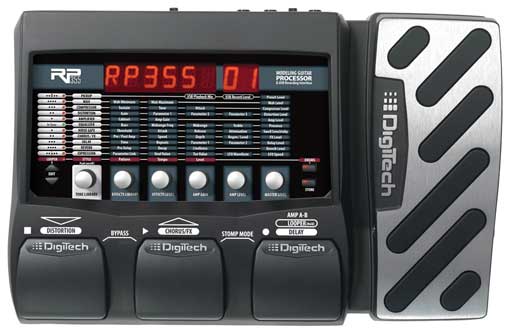Tony Eyers Testimonial
A review of Richard Hunter's RP350 patch set
This review of our Huntersounds patch set for the Digitech RP250/255/350/355 was posted to the harp-l list by Australian harp guru Tony Eyers on 4 March 2010.
In recent years amp modeling pedals have developed significantly. For example, the Digitech RP series offers a wide range of well known amp models and quality effects for under $200. These devices are designed for guitar but potentially suit harmonica, with the right settings. Finding these settings is not easy.
Fortunately Richard Hunter has done the work. His Digitech RP patch set, available online for $35 provides a wide range of good harmonica sounds.
The classic approach to amplified harmonica is a bullet type mike, a low to mid powered valve guitar amp and perhaps some analog delay. The result is variations of the classic Chicago sound, most blues harmonica players are after "that sound". Given the gear available these days (e.g. Sonny Jr, Harpgear amps) it is not so hard to get.
Other players, myself included, need a cleaner sound through a vocal mike (e.g. SM58) perhaps using a clean tube preamp with some delay.
For some time I've wanted both, a quality clean sound through a pedal which also provides a strong Chicago type sound on demand. I've experimented previously with the Digitech RP 100, liked the Chicago type sound, but was unimpressed with the clean sound, the delays and the reverbs. The newer Digitech RP350 has a range of clean preamp sounds, as well as high quality reverbs and delays, in addition to the classic guitar amp models. Plus Richard Hunter has done all the work by figuring out the harmonica settings (or patches).
I figured it was time for another look.
Richards patches arrive as a zip file, which organises the patches into directories (blues, clean etc), along with clear instructions for use. The RP350 has a USB interface, so all the patches can be loaded in one go. Very nice. Previous RP models required each patch to be entered by hand. Within 15 minutes my new RP350 was ready to go, with around 70 patches.
Richard designed the patches for the Audix Fireball V, a low impedance purpose designed harmonica mic, available online for around $130. An impedance converter is needed, the Audix T50k (around $25) an obvious choice. I tried the patches with a Green Bullet, the blues ones sounded great, the clean ones less so. Not surprising, given the restricted frequency response of the Green Bullet compared with the Audix Fireball V.
The basic idea is to run the RP350 (or whatever model) into either a clean amp (e.g. keyboard) or a PA. I ran it through a 300 watt SoundKing powered speaker, with a 12 inch and horn. I got massive volume from this small box, with very little feedback. If you already get a Chicago type sound through a valve amp, then running it with the RP350 blues patches is not recommended, as you create the same sound twice. However, Richard does provide "effect only" patches (reverb, delay, chorus). These can feed directly into a guitar amp, and are worth trying. particularly since the various effects can be controlled via the foot pedal.
Enough details. How do they sound?
In a word, just great. The first patch in the "by amp model" set is based on a Fender '57 Tweed Champ, with a complex combination of delay, reverb, chorus, noisegate and eq. The result is simple. A big fat traditional authentic sound. You may end up sticking with this one. Pushing the foot pedal down increases the delay, pressing the A/B switch toughens the sound
Subsequent patches add different effects, these include
- Octave: either high or low, controlled by the foot pedal. A very different sound, some will like it, others not
- Vibrato: Dramatic. Again, probably for some, not others
- Leslie: the classic organ sound, with the pedal controlling speed. Potentially great for long background notes
- Flanger: a tough Rock and Roll sound
- Chorus: I've never been a fan of Chorus pedals for harmonica (or any pedals apart from delay). However the answer is to use just the right amount. I like Richard's chorus sounds.
There are many more sounds available than can be described here. Best to try them yourself. Two more deserve mention. Firstly, the clean sounds are just that. And, the RP350 detune provides a very decent tremolo sound.
In short, while the RP350 is a great device, the myriad of potential settings would overwhelm most. Finding the needles in the haystack which suit harmonica requires much time, an analytical mind, and a great ear for harmonica. Fortunately Richard Hunter has these skills, and has made the results available to us.
Around $350 buys an RP350/355, an Audix Fireball V mic and impedance convertor and Richard Hunter's patches. I can't see any similar investment which provides such a range of quality harmonica sounds. I highly recommend them.

